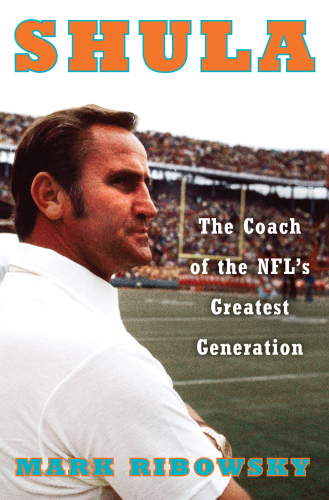
Shula
The Coach of the NFL's Greatest Generation
کتاب های مرتبط
- اطلاعات
- نقد و بررسی
- دیدگاه کاربران
نقد و بررسی

Starred review from May 20, 2019
Biographer Ribowsky (The Last Cowboy; Howard Cosell) provides a hard-nosed and decidedly unromantic biography of the NFL’s winningest coach, Don Shula, who led the 1972 undefeated Miami Dolphins to a Super Bowl victory. Ribowsky begins with Shula’s Depression-era, Hungarian-immigrant upbringing in Grand River, Ohio, telling of how Shula worked odd jobs as a teenager during WWII while excelling in high school football. Through Shula’s career, Ribowsky provides an excellent look into the early, gritty days of professional football, explaining how Shula, playing for the Baltimore Colts in the mid-1950s, “would throw an elbow into a receiver’s eye as soon as look at him.” In 1957, Shula retired from playing; three years later, he became the defensive coordinator for the Detroit Lions; in 1963, he returned to the Colts as head coach; and, in 1970, he was hired to helm the Dolphins. Throughout, Ribowsky highlights Shula’s brand of tough, old-school coaching, along with a solid history of the birth of the AFL and the evolution of the NFL, with anecdotes ranging from raunchy dorm-room parties at camp (which Shula did not appreciate) to Shula’s “flawless” game plan in Super Bowl VII, in which the Dolphins defeated the Washington Redskins. Ribowsky’s excellent biography will thrill football fans of all allegiances.

June 15, 2019
Well-paced, anecdotal life of the great NFL coach by well-practiced biographer Ribowsky (In the Name of the Father: Family, Football, and the Manning Dynasty, 2018, etc.). Don Shula (b. 1930) was an examplar of the working-class dream: A self-made, determined young man from the Rust Belt, a first-generation American with no advantages save for his athletic gifts makes good, and in the end, he grows wealthy. In the author's opening note, he also emerges as a sharp judge of character. Offered a job coaching by then USFL team owner Donald Trump, he declined: "Moral: Shula was a very winning coach, and a very rich one, because he could take the measure of men he respected, and quickly discard those he didn't." Score one for Shula, whose early career as a coach was rocky but solid. He made a less-than-laughingstock team out of the hapless Baltimore Colts, for example, turning them into "blue-collar leviathans" but still coming up short come championship time. "Shula has the best winning record in football," said one critic, "and the worst record in big games." So it would remain, though Shula made a tough and tenacious team out of the Miami Dolphins, captained by the formidable Dan Marino--who, born at the tail end of the baby boom, is a touch too young to do much hard work supporting Ribowsky's thesis that Shula flourished during a halcyon time for football, part of the sport's "greatest generation." While golden-boy players such as Joe Namath and Johnny Unitas take their places in these pages, whether as heroes or as bêtes noires, the best moments have a kind of workaday North Dallas Forty quality replete with sex, drugs, and ripping Howard Cosell's toupee off his head. Ribowsky isn't above a groaner of a cliché ("it was clear that what sustained him for so long wasn't the sizzle, but the meat"), but for the most part, the prose holds up to gridiron rigors. Must reading for budding coaches and a solid work of sports biography.
COPYRIGHT(2019) Kirkus Reviews, ALL RIGHTS RESERVED.

August 1, 2019
Ribowsky (In the Name of the Father: Family, Football, and the Manning Dynasty; A Complete History of the Negro Leagues: 1884-1995) assays a football giant in Don Shula (b. 1930). Shula was a two-time Super Bowl champion and led the only undefeated team in league annals. The author details Shula's problems with meddling owners; his sometimes-rocky relationships with star players such as Johnny Unitas, Larry Csonka, and Mercury Morris; and his emergence as a league eminence, while intimating he was perhaps not as pure as his cultivated image. Ribowsky relies primarily on interviews with Shula and on the written record; however, more interviews with players and colleagues would have been welcome. Shula's greatest success came coaching the Miami Dolphins in the early 1970s. Ribowsky portrays a blunt, onetime NFL player noted for his aggressive play who was driven as much by failure as by success, in particular his troubles in playoff and championship games and failure to win a title in his final 22 years of coaching. VERDICT This is the most thorough biography yet of this seminal NFL figure, but it does not equal Ribowsky's best work.
Copyright 2019 Library Journal, LLC Used with permission.

























دیدگاه کاربران